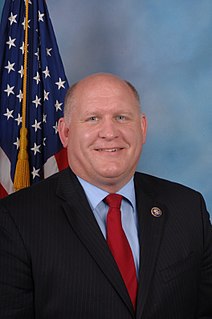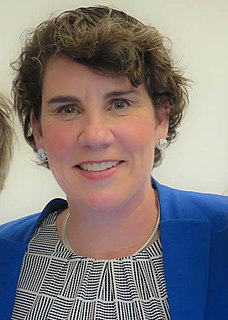A Quote by Angus Deaton
I, who do not believe in socialized health-care, would advocate a single-payment system... because it will get this monster that we've created out of the economy and allow the rest of capitalism to flourish without the awful things that healthcare is doing to us.
Related Quotes
[I] vow[ed] to fight against socialized medicine....On healthcare, I agree with the President that we need to get costs under control...I can also say without hesitation, that the quality of healthcare in this county is second to none - and sacrificing quality to achieve these necessary reforms is not acceptable. A single payer, government run healthcare system is the worst possible way to achieve this goal.
One such troubling provision is a tax increase to pay for the $635 billion included in the budget for health care 'reserve funds.' Health care reform is desperately needed in America, but I'm concerned that $635 billion will be a down payment on socialized medicine, causing the impersonal rationing of health care and destroying the doctor-patient relationship.
In comparison to the U.S. health care system, the German system is clearly better, because the German health care system works for everyone who needs care, ... costs little money, and it's not a system about which you have to worry all the time. I think that for us the risk is that the private system undermines the solidarity principle. If that is fixed and we concentrate a little bit on better competition and more research, I think the German health care system is a nice third way between a for-profit system on the one hand and, let's say, a single-payer system on the other hand.
The problem of giving health care to everybody cannot be solved so long as we're spending huge sums of money for war. Already we have a very wasteful healthcare system, the most wasteful healthcare system in the world. I mean, we spend the most money and still have 40 million people without insurance. Compare us to Cuba. Cuba is our enemy, run by a dictator, Fidel Castro. But people in Cuba get health care at least equal to that of the United States - with very scarce resources. So I think this issue is the most important domestic issue.
If you want to look at a purely socialized health care, you would have to go to the United States, where we have it. In particular, that's the system we reserve for our veterans. So if I hear politicians run down socialized medicine - and I have done that before the Congress - I say: Do you hate your veterans? Why do you reserve purely socialized medicine - there's only the U.S. and Cuba that have that - for the veterans? So getting the terms right would be very, very helpful in our national conversation on health reform.
This is what I would call old politics. This is the stuff we're trying to get rid of. Because the problem is, when we start breaking down into conservative and liberal, and we've got a bunch of set predispositions, whether it's on gun control, or its' on health care, any attempt to do health care is socialized medicine.
Here's what I do believe very strongly: that once capitalism comes into existence, once it creates this mythology of a stingy nature, then that myth has to be exorcised. In other words, we have to get out of people's heads the idea that without a market economy, without egotism, competition, rivalry and self-interest, without all the technological advances that [Karl] Marx imputed to capitalism, we have to eliminate the feeling that we would sink into some kind of barbarism.
As a society, almost one 1 of 2 adults has a chronic disease of one form or another. And where we're spending $3 trillion a year not on a healthcare system, but on a sick-care system that tries to patch us up after we've been made ill by a variety of institutional things around us - including a sick food system, air pollution, etc. Where we could be doing so much better even before people get to the point of getting sick.
The United States remains the only major country on earth that doesn't guarantee health care to all of our people. And yet we are spending almost twice as much per capita. We have a massively dysfunctional health care system. And I do believe in a Medicare for all single-payer system, whether a small state like Vermont can lead the nation, which I certainly hope we will, or whether it's California or some other state.
Capitalism is very far from a perfect system, but so far we have yet to find anything that clearly does a better job of meeting human needs than a regulated capitalist economy coupled with a welfare and health care system that meets the basic needs of those who do not thrive in the capitalist economy. If we ever do find a better system, I'll be happy to call myself an anti-capitalist.





































